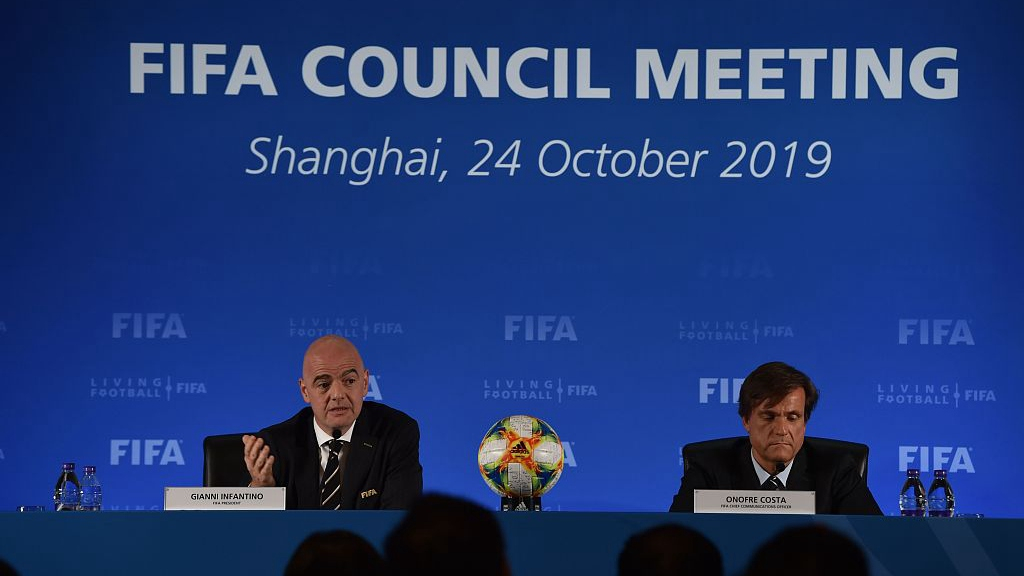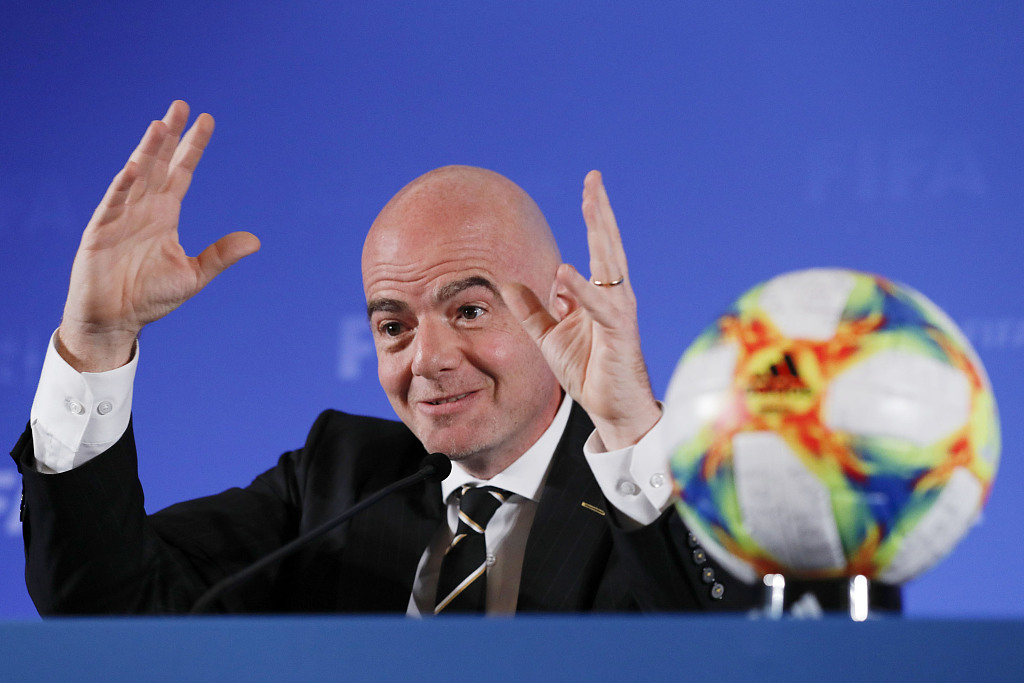
FIFA President Gianni Infantino (L) speaks at a press conference during the football federation's Council meeting in Shanghai, October 24, 2019. /VCG Photo
FIFA President Gianni Infantino (L) speaks at a press conference during the football federation's Council meeting in Shanghai, October 24, 2019. /VCG Photo
Editor's note: Matteo Giovannini is a finance professional at ICBC in Beijing and a member of the China Task Force at the Italian Ministry of Economic Development. The article reflects the author's views and not necessarily those of CGTN.
On Thursday, FIFA president Gianni Infantino said China would host the inaugural edition of the expanded Club World Cup. While the current format of the competition just includes the winners of the six continental confederations as well as the host nation's league champions, the awarded edition will be the inaugural edition expanded to 24 teams. It will take place in 2021 and be held every four years.
The FIFA Club World Cup was first contested in 2000 as the FIFA Club World Championship running in parallel with the Intercontinental Cup from 2000 to 2004. In 2005, the Intercontinental Cup was merged with the FIFA Club World Championship, and in 2006, the competition changed its name into FIFA Club World Cup.
This event represents another major achievement for China after having successfully organized the Summer Olympic Games in 2008 and the Basketball World Cup this year. The Winter Olympic Games in 2022 will make Beijing the only city to have organized both summer and winter editions of the Olympic Games and will put China at the center of the global stage in sports for the biennium 2021/2022.
The significance of this decision goes well beyond sport. FIFA confirmed that no other country has been considered for the inaugural edition other than China, which is a clear message of highlighting the importance of the Chinese market for the future of this sport.

FIFA President Gianni Infantino speaks to the media after a FIFA Council Meeting at Shanghai Mandarin Oriental in Shanghai, China, October 24, 2019. /VCG Photo
FIFA President Gianni Infantino speaks to the media after a FIFA Council Meeting at Shanghai Mandarin Oriental in Shanghai, China, October 24, 2019. /VCG Photo
Football is the most popular sport in the world, but it hasn't reached yet the same level of basketball in China. This is probably due to the lack of significant sports achievements of the National Team led by the Italian coach Marcello Lippi. An event like the FIFA Club World Cup would certainly grab the attention of Chinese fans eager to watch the performances of players such as Cristiano Ronaldo and Lionel Messi.
The organization of this event could have a positive impact on Chinese younger generations of football fans. Together with the investments of European teams that have opened football schools in the country to develop local talents through the improvement of their technique and tactical skills, this could certainly have a beneficial impact on the future performance of the Chinese National Team.
Major football events are always a catalyst for investments of major brands, especially in marketing, as they lead to an increase of consumption in merchandising, and have in this way a positive impact on China's GDP. Global events like this one could also help to increase the attractiveness of less-known Chinese locations with an increase in inbound tourism.
Another aspect to be considered is that historically, football has always had an impact even outside of the pitch. Major countries in the past have used the successes in this sport as leverage in terms of soft power. China could use this event as a tool to express its growing importance on the global stage. Moreover, a successful organization of the event in 2021 could possibly lead to the assignment of the World Cup within 2050 as planned by the Chinese government.
The scenario for Chinese football fans is bright after this historic decision, and it goes in the direction of the plans of China to have a National team qualified for the World Cup by 2050.
The decision to assign the FIFA Club World Cup to China is definitely a win-win decision for both China, that will get the opportunity to have the world's eyes on itself once again, and for the football industry, which is eager to increase its streamline of revenues in a huge market such as the Chinese one.
(If you want to contribute and have specific expertise, please contact us at opinions@cgtn.com.)